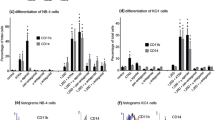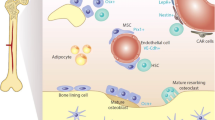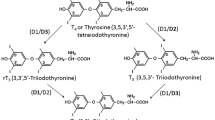Abstract
Receptors for L-triiodothyronine (T3) and all-trans retinoic acid (ATRA) are DNA-binding proteins that can form transcriptionally active heterodimers. In this study, we sought whether T3 and ATRA could cooperate to modulate human and mouse erythropoiesis in vitro. Effects of T3 and ATRA were first assessed on burst forming unit-erythroid (BFU-E) proliferation and differentiation in semi-solid cultures. T3 did not alter the cloning efficiency of BFU-E but it decreased the production of colony forming unit-erythroid (CFU-E) during the course of BFU-E development. In contrast to T3, ATRA inhibited the early steps of BFU-E proliferation. ATRA and T3 acted in a dose-dependent manner with optimal effects at 10−6 M and 10−8 M, respectively. Furthermore, T3 and ATRA used in combination had more pronounced effects than when used alone, but only at their respective optimal concentrations, indicating that these effects were additive rather than synergistic. Similar results were obtained with unfractionated mouse bone marrow cells or human CD34+ bone marrow cells, suggesting that the effects of T3 or ATRA were not mediated by accessory cells. This study was extended to the mouse IL-3-dependent NFS-60 cells that can differentiate in vitro into mature erythroid cells in response to erythropoietin (Epo). When used alone, neither T3 nor ATRA could affect NFS-60 cell proliferation in response to Epo; however, T3 and ATRA had an anti-proliferative effect when used together. In addition, T3 dramatically reduced the proportion of hemoglobinized colonies in Epo-stimulated cultures of NFS-60 cells. Furthermore, ATRA, but not T3, could inhibit the IL-3-dependent proliferation of NFS-60 cells. Altogether these data suggest that T3 and ATRA can cooperate in modulating in vitro erythropoiesis although having individual effects at different but overlapping steps along the erythroid pathway.
Similar content being viewed by others
Author information
Authors and Affiliations
Additional information
Supported by grants from CNRS, Fondation pour la Recherche Médicale, Fondation de France and Association pour la Recherche contre le Cancer. M.C.P. was a recipient of a grant from Fondation pour la Recherche Médicale.
Rights and permissions
About this article
Cite this article
Perrin, M.C., Blanchet, J.P. & Mouchiroud, G. Modulation of human and mouse erythropoiesis by thyroid hormone and retinoic acid: evidence for specific effects at different steps of the erythroid pathway. Hematol Cell Ther 39, 19–26 (1997). https://doi.org/10.1007/s00282-997-0019-2
Received:
Accepted:
Issue Date:
DOI: https://doi.org/10.1007/s00282-997-0019-2




